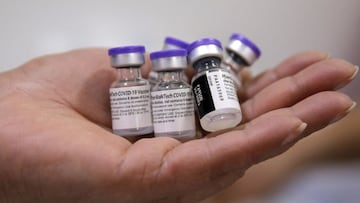Why hasn't the FDA officially approved the coronavirus vaccines?
All current covid-19 vaccines are currently listed for 'emergency use,' the FDA hasn't yet fully approved a single one.


What's the difference?
Due to the covid-19 pandemic, a US public health emergency was announced. This allowed the FDA to authorise emergency use of new drugs, treatments and vaccines without having to go through the full approval process.
That's not to say the vaccines are unsafe, there is still a rigorous testing procedure that is carried out. For emergency authorization, the FDA requires two months of safety data versus six months for full approval for the currrent vaccines in circulation.
How do vaccines usually get fully approved?
Usually the process takes up to ten months before a vaccine is fully approved. However, both Pfzier and Moderna have applied for special consideration for a "serious and unmet medical need." Even with this qualifier, the process could take up to six months. For Moderna, this means that their vaccine could be fully approved at the turn of the new year. The Pfizer vaccine is expected to receive full FDA approval by labor day at the latest due to the rapid increase of Delta variant cases.
FDA aiming to give final approval to Pfizer vaccine by early next month -NY Times https://t.co/CmucRYHDQs pic.twitter.com/WofqrCAJCc
— Reuters (@Reuters) August 4, 2021
Why is it taking so long?
Apart from consideration for if fully approved drugs do their job, there are also political and financial barriers to traverse. Former President Donald Trump heavily criticised the organisation and there have been doubts, and an ongoing investigation, surrounding the approval of an Alzeihmer's drug called Aduhelm.
If it were proved in the future that there were serious side-effects to the covid-19 vaccines and the FDA had fully approved them, there were be huge financial and legal repercussions for the organisation and the US government. It's simply a risk they won't take.
More Delta variant stories:
- Do all states have to follow the mask mandate?
- Which countries are in the ‘Level 4: Do not travel' category?
- What American companies require their employees to be vaccinated?
- When would it be necessary to have the third covid-19 vaccine?
- Why is the CDC recommending that vaccinated people wear masks indoors?
Does it matter?
In the short term it doesn't really. As long as people are taking up the vaccine then it makes no material difference whether a vaccine has been fully approved or not.
Related stories
However, there has been some recent polling which could indicate that one of the primary reasons people are hesitant to take up the vaccine is because they are not fully approved.
People who say they would be more likely to get vaccinated if they got $100 cash: 14%
— Ken Klippenstein (@kenklippenstein) August 1, 2021
People who say they would be more likely to get vaccinated if it was required to fly: 41% pic.twitter.com/7rLl0nWmFy
This issue may need to be addressed, but there are work-arounds. With other factors, such as a restriction on the ability to fly, included, a stick-over-carrot policy could be beneficial to pick up the stalling vaccination rate. Currently the attempt to increase the vaccination rate includes a $100 thank you gift.

